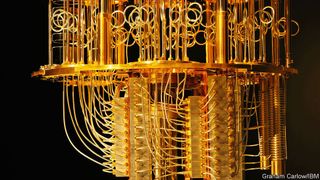Microsoft's revelatory quantum computing theory disproved by new evidence
Microsoft didn't find that elusive particle after all

A ground-breaking discovery made by Microsoft in 2018, which could have had a profound impact on the company’s quantum computing plans, has now been discredited.
Three years ago, Leo Kouwenhoven, a Dutch physicist and Microsoft employee, claimed to have found evidence of a subatomic particle that could lead to a rapid rollout of commercial quantum computers but the findings have now been dismissed.
A follow-up paper by Kouwenhoven and his fellow researchers has admitted that further data has revealed that the elusive Majorana fermion particle was not found as previously claimed. Their original scientific paper, published in Nature, will now be retracted as a result of “technical errors.”
- Here's our list of the best cloud computing services right now
- Check out our list of the best cloud storage solutions
- We've also built a list of the best cloud hosting providers
Somewhat embarrassingly, other researchers that have scrutinized the data from the original experiment have questioned why Kouwenhoven did not identify the flaws in his working sooner. When looking at the data in full, Sergey Frolov, a professor at the University of Pittsburgh, has said that it is clear that they “skipped some data that contradicts directly what was in the paper.”
Reasons to get carried away
When Microsoft initially made its discovery of the Majorana fermion public, there were reports that the company could release a quantum computer in less than five years. A race is on to make the technology more commercially viable because of the many benefits that it could potentially offer.
By making faster calculations, quantum computing could lead to new scientific breakthroughs, create new financial strategies, and deliver better insights in all kinds of industries, from medicine to marketing. Overall, by allowing businesses to visualize data faster and more efficiently, there’s no way of predicting all of the benefits that will ultimately emerge.
There are some concerns surrounding the expansion of quantum computing devices, however. In particular, some experts have theorized that quantum computers would be able to crack modern encryption software in hours, meaning a rethink of global security systems would be required.
Are you a pro? Subscribe to our newsletter
Sign up to the TechRadar Pro newsletter to get all the top news, opinion, features and guidance your business needs to succeed!
- Here's our rundown of the best servers for your business
Via WIRED
Barclay has been writing about technology for a decade, starting out as a freelancer with ITProPortal covering everything from London’s start-up scene to comparisons of the best cloud storage services. After that, he spent some time as the managing editor of an online outlet focusing on cloud computing, furthering his interest in virtualization, Big Data, and the Internet of Things.

